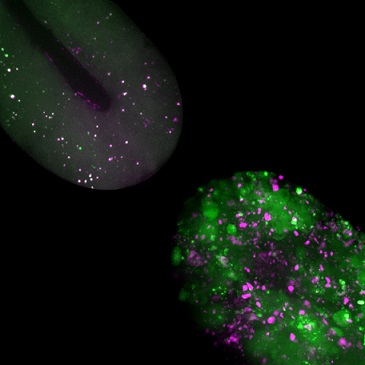News Archive
Roles of autophagy during tumorigenesis
January 2016. Autophagy can act either as a tumor suppressor or as a survival mechanism for established tumors. To understand how autophagy plays this dual role in cancer, in vivo models are required. By using a highly heterogeneous C. elegans germline tumor, the research group of Christian Pohl in collaboration with the research group of Ivan Dikic could now show that autophagy-related proteins are expressed in a specific subset of tumor cells, the neurons. Moreover, they could demonstrate that inhibition of autophagy impairs neuronal differentiation and results in a shorter life span of animals with tumors. In contrast, induction of autophagy extends life span by impairing tumor proliferation, which also depends on modular changes in transcription networks and mitochondrial metabolism. The findings from this work, recently published in the journal 'Autophagy', suggest that metabolic restructuring, cell-type specific regulation of autophagy and neuronal differentiation play key roles in regulating the growth of heterogeneous tumors. More ...

Figure:
Formation of germline tumors leads to strong induction of autophagy in C. elegans worms.
Top left: Expression of tandem-fluorescent LGG-1/GABARAP in the wild type germline.
Bottom right: Expression of the same transgene in a germline after tumor induction.
Contact:
Christian Pohl
Buchmann Institute of Molecular Life Sciences
Goethe University Frankfurt, Germany
Pohl@em.uni-frankfurt.de
Publication:
Gomes LC, Odedra D, Dikic I, Pohl C (2016) Autophagy and modular restructuring of metabolism control germline tumor differentiation and proliferation in C. elegans. Autophagy, DOI: 10.1080/15548627.2015.1136771. Link ...

